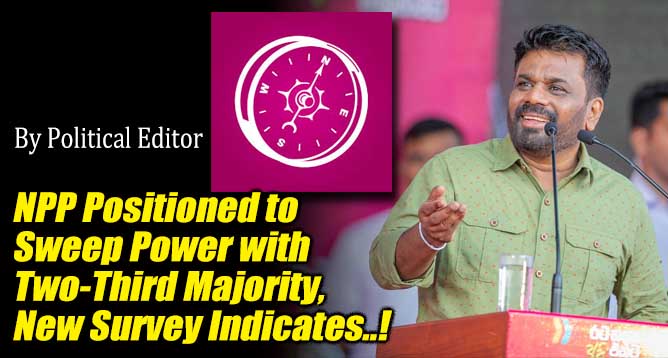-By Political Editor

(Lanka-e-News -11.Nov.2024, 11.30 pm) As Sri Lanka inches closer to the parliamentary election on November 14, the National People’s Power (NPP) led by Anura Kumara Dissanayake appears poised for an extraordinary victory, according to recent surveys. Following his decisive win in the presidential election on September 21, Dissanayake’s popularity has surged, with the NPP presenting itself as a force for unity, reform, and economic relief.
The NPP’s appeal to voters is deeply rooted in their commitment to addressing key issues plaguing Sri Lanka, particularly the high cost of living and the call for a government that serves all Sri Lankans equally. Dissanayake’s administration has focused on tackling inflation and reducing living expenses—a priority that has resonated strongly with voters. By stabilizing essential commodity prices and curbing inflation, the NPP has become a beacon of hope for those weary of economic hardship.
Adding to the NPP’s popularity is its strong stand on national unity and non-discrimination. Dissanayake has made clear his government’s commitment to governing without bias, implementing reforms across communities and ensuring that laws are applied impartially, irrespective of ethnicity or religious background. The approach has garnered unprecedented levels of support from previously polarized segments of the population, helping bridge gaps that years of political tension and ethnic strife had widened.
A significant factor in the NPP’s surge lies in the support from Sri Lanka’s Muslim community, who, after decades of feeling marginalized, see a fresh opportunity for equal representation. Survey results suggest that a substantial majority of Muslim voters are leaning toward the NPP, buoyed by the party’s stance on unity and its promises to bring peace and prosperity to all communities.
The Muslim vote is expected to play a pivotal role in the NPP’s projected victory. As one of Sri Lanka’s largest minority groups, the Muslim community’s endorsement could be the key to pushing the NPP’s vote share past the critical threshold needed for a two-thirds majority, especially in tightly contested districts.
Perhaps even more noteworthy is the growing support for the NPP among Tamil voters in the Northern and Eastern provinces. Historically, these areas have shown loyalty to ethnic and regional parties, but this election appears to be a turning point. Surveys indicate that Tamil voters, frustrated with unfulfilled promises from past administrations, are looking to the NPP for genuine representation.
Dissanayake’s promise to ensure equitable development in Tamil-majority areas and his commitment to respecting cultural rights have found favor with Tamil voters. Many Tamil voters feel the NPP’s policies are more inclusive than those of previous governments, promising them a stake in national governance rather than merely regional concerns.
This support in the North and East could prove critical, allowing the NPP to secure crucial seats and expand its influence in traditionally difficult regions, thereby helping to secure a two-thirds majority.
The up-country Tamil community, another influential voting bloc, has also displayed a noteworthy shift toward the NPP. Traditionally, this community has voted along ethnic lines or for regional parties, but recent data shows that 39% of up-country Tamil voters are now inclined to vote for the NPP—a substantial increase from previous elections.
This increase can be attributed to the NPP’s promises of social and economic support for plantation workers, who often face lower wages and poorer working conditions than other sectors. Dissanayake’s direct engagement with up-country Tamil leaders and his assurances of labor rights and better wages for plantation workers have helped foster a sense of trust in the NPP’s vision.
Despite the overwhelming support in various communities, there are some challenges. Voter turnout has been reportedly low in the days leading up to the November 14 election, as citizens contend with ongoing economic pressures and disenchantment with the political process. Some analysts suggest that a lower turnout might affect the NPP’s chance of reaching a two-thirds majority, but others argue that the NPP’s grassroots network and its active campaign could rally voters on election day.
The NPP has been running an extensive campaign to motivate voter participation, reminding citizens of the stakes in this election and the historic chance to reshape the nation’s political landscape. Their message has been simple yet powerful: “This is our chance to choose a future free from corruption, division, and mismanagement.”
If the NPP achieves a two-thirds majority, it will have the mandate to implement sweeping reforms. Many observers predict that a parliamentary majority would allow the NPP to pursue constitutional amendments aimed at reducing executive power and increasing parliamentary oversight.
There’s also speculation about reforms in the judicial sector to ensure the rule of law is upheld across all levels, with measures to combat corruption and hold public officials accountable. Economic reforms are expected to focus on reducing import dependency, enhancing local industries, and providing more employment opportunities for Sri Lankans.
For the first time in years, the people of Sri Lanka are witnessing a political movement that seems genuinely dedicated to restoring integrity to governance. Dissanayake’s administration is expected to follow through on these promises, especially given the urgency of addressing the current economic situation.
The NPP’s commitment to bringing down the cost of living, establishing legal reforms, and fostering national unity has not only resonated with voters but has reinvigorated Sri Lanka’s democracy with a sense of possibility.
---------------------------
by (2024-11-11 19:37:46)
Leave a Reply